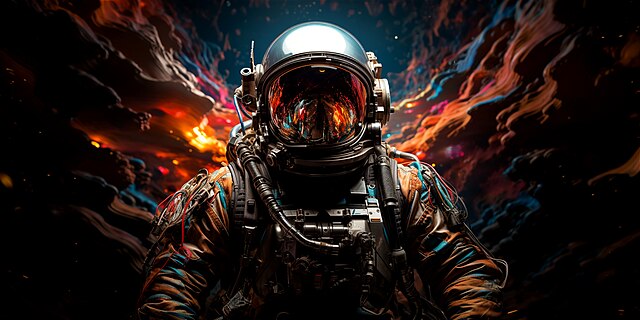
Science Fiction Masters
The Enduring Influence of Phillip K. Dick, Arthur C. Clarke, and Isaac Asimov
Science fiction owes much of its richness to the visionary minds of its pioneering authors. These luminaries not only shaped the trajectory of science fiction but also left an indelible mark on literature, film, and even the real-world discourse surrounding technology. As we embark on this exploration of the genre’s vast galaxies, we’ll delve into the enduring influence of three titans: Philip K. Dick, Arthur C. Clarke, and Isaac Asimov. Alongside them stand other giants like Robert A. Heinlein, H.P. Lovecraft, and Ray Bradbury, each contributing unique threads to the complex narrative of speculative fiction.
Philip K. Dick
Philip K. Dick’s impact on science fiction is akin to a mind-bending journey through the labyrinth of reality itself. His exploration of existential and psychological themes transcends mere storytelling, leaving readers questioning the nature of consciousness. Dick’s influence extends far beyond the pages of his novels, as evidenced by the numerous film adaptations of his work. “Blade Runner,” an adaptation of his novel “Do Androids Dream of Electric Sheep?” became a cinematic landmark, shaping the cyberpunk genre and influencing the aesthetic of dystopian futures.
Dick’s ability to intertwine speculative fiction with profound philosophical questions has not only left a lasting mark on the genre but also seeped into the broader cultural consciousness. As discussions about artificial intelligence and the nature of reality continue to evolve, Dick’s ideas remain pertinent, proving that his impact goes beyond the boundaries of traditional science fiction.
Philip K. Dick’s profound influence on the world lies in his exploration of existential and psychological themes within science fiction. His works, delving into the nature of reality and identity, resonate beyond literature, permeating popular culture and challenging conventional perceptions of consciousness. PKD’s influence is evident in the cyberpunk genre and numerous film adaptations, like Blade Runner, which continue to shape discussions on artificial intelligence, dystopia, and the ethical implications of technology. His ability to intertwine speculative fiction with profound philosophical questions has left an enduring impact, inspiring a legacy that transcends genre boundaries and stimulates ongoing contemplation of the human condition.
Arthur C. Clarke
In the cosmic expanse of science fiction, Arthur C. Clarke stands as a bridge between imagination and scientific vision. His seminal work, 2001: A Space Odyssey, is not merely a novel or a film; it’s a symphony of ideas that reverberated through both the literary and cinematic realms. Clarke’s accurate predictions about satellite communication and geostationary orbits showcase his prescient understanding of technology.
Arthur C. Clarke’s impact on the world is profound, especially in the realms of science and technology. Clarke accurately foresaw technological advancements such as satellite communication and geostationary orbits. His influence extends beyond literature; Clarke’s collaboration with Stanley Kubrick on the film adaptation of 2001 transformed cinematic science fiction. His ideas inspired scientists and engineers, contributing to the development of communication satellites, influencing the Space Race, and fostering a global fascination with space exploration. Clarke’s legacy endures as a visionary who not only predicted the future but also played a role in shaping it.
Isaac Asimov
Isaac Asimov, often regarded as the grand architect of both science fiction and science itself, crafted worlds that seamlessly blended speculative imagination with scientific rigour. His “Foundation” series and “Robot” series are pillars of the genre, exploring themes of psycho-history and the ethical implications of artificial intelligence. Asimov’s Three Laws of Robotics, introduced in his science fiction stories, have significantly influenced discussions on artificial intelligence (AI) ethics. The laws are designed to ensure robots prioritise human safety and well-being. While not legally binding, they sparked ethical debates in AI development. Engineers and ethicists reference these laws to ponder the ethical implications of autonomous systems.
Asimov’s conceptual framework has inspired real-world guidelines for AI development, emphasising the importance of incorporating ethical considerations and safety measures into the design and deployment of intelligent machines. The Three Laws continue to shape the ethical discourse surrounding AI and robotics, providing a foundation for responsible innovation. His work has never been more relevant.
Honourable Mentions: Heinlein, Lovecraft, and Bradbury
While exploring the influence of PKD, Clarke, and Asimov, it’s essential to acknowledge the broader constellation of science fiction luminaries. Robert A. Heinlein’s emphasis on hard science and libertarian ideals, H.P. Lovecraft’s pioneering contributions to cosmic horror, and Ray Bradbury’s poetic exploration of societal themes have each enriched the genre in their own unique ways.
Heinlein’s Stranger in a Strange Land and Starship Troopers challenged societal norms, contributing to the genre’s Golden Age. Lovecraft’s Cthulhu Mythos not only reshaped horror literature but also left an enduring mark on speculative fiction as a whole. Bradbury’s lyrical prose and exploration of dystopian themes in Fahrenheit 451 continue to resonate for their timeless relevance and emotional impact. Together, these writers form a tapestry of ideas that has shaped the diverse and ever-evolving landscape of science fiction.
Science Fiction Talent For Generations
As we reflect on the contributions of Philip K. Dick, Arthur C. Clarke, and Isaac Asimov, it becomes clear that their influence extends far beyond the boundaries of genre fiction. These titans not only crafted captivating stories but also sparked conversations that transcend the pages of their books.
In the ever-expanding cosmos of speculative fiction, their ideas continue to inspire, challenge, and shape our understanding of the universe, both imagined and real. As we navigate the galaxies of their collective imagination, we find ourselves enriched by the enduring legacy of these literary pioneers and it’s unlikely they’ll be forgotten any time soon. They’ve managed to achieve what many science fiction tales ponder: immortality.